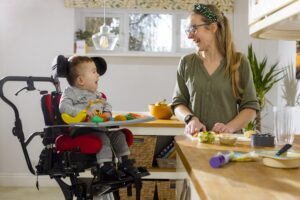No ordinary boy
A rare genetic condition left baby Ollie Williams unable to swallow. Kelly August found out how the Paediatric Dietetic Service is helping Ollie, now two, and his mum and dad by going back to basics.

Young Ollie steals the hearts of everyone he meets. He is highly intelligent and knows what he wants and with a purely magical smile, he’s sure to get it. Ollie is not just any ordinary boy. He is one in 10,000.
Mum Amy, 31, was enjoying an easy pregnancy and together with husband Ben, they couldn’t wait to welcome their precious baby into their home in the idyllic village of Wye near Ashford.
Three months later, they were in A&E at the William Harvey Hospital and Ollie was diagnosed with Spinal Muscular Atrophy (SMA) Type 1.
Amy said: “In hindsight there were symptoms from birth. Ollie wasn’t feeding properly and he was tummy breathing when asleep. As new parents, we asked questions but were reassured it was normal.”
About 70 babies are born with SMA in the UK each year and one in 40 people are genetic carriers. To put that in context, the year Ollie was born, more than 681,560 babies were born in the UK.
SMA is caused by a mutation in the survival motor neuron 1 (SMN1) gene, which is responsible for producing a protein that is essential for motor neuron survival.
Motor neurons are nerve cells that control muscle movement and strength. They control muscle activity by sending signals from the central nervous system to muscle cells. In SMA, as motor neurons deteriorate, muscles stop receiving signals, which leads to muscle weakness and atrophy.
Ben said: “As Ollie wasn’t diagnosed until he was three months-old, many of his motor neurons had already perished. This meant he wasn’t able to swallow much milk and wasn’t putting on weight.”
Ollie was admitted back to hospital and began tube feeding.
In May 2021, the NHS treated their first SMA patient with Zolgensma, a one-off gene therapy which has the potential – if administered early enough – to give babies the ability to sit, crawl and walk. Critically, it prevents them from having to be put on a ventilator. A life changing drug, which is also one of the world’s most expensive, at a staggering cost of £1.795 million per single dose.
Amy continued: “Ollie was the ninth child to receive this new treatment at the Evelina London Children’s Hospital. At that time only 15 children had received the treatment in the country.
“He may never regain the use of some of his muscles but his movement has improved and he has achieved milestones we never thought possible.”
Because Ollie has an unsafe swallow, he had a percutaneous endoscopic gastrostomy (PEG) tube fitted which allows Amy and Ben to feed Ollie safely.
To support the family, a referral was made to KCHFT’s Paediatric Dietetic Service.
With about 70 referrals per week, the service helps nearly 400 tube-fed children across the county. This includes premature babies who may need short-term support, to more longer-term patients with disabilities, anxiety or sensory difficulties.
Highly Specialist Paediatric Dietician Jo Hulks said: “When I started my career there was one type of tube feed. Three decades on, there is a large range of tube feeds available, including vegan, vegetarian and feeds that consider particular allergies. Using ‘normal’ food for tube feeding was not recommended as there was not enough research or evidence to show it was possible.
“Blended feeding for tube-fed patients is a relatively new approach. Every patient has different needs, we have to consider the nutritional value of each meal to make sure they are getting all they need. Some foods can’t be blended and may block tubes and of course the families themselves need to be confident enough in planning and preparation to get it right.
“For some families, it’s exactly what they need. As a parent, we want to be able to provide for our children and that includes cooking them a dinner. Now with blended feeding, they can do just that.”
Amy added: “When Ollie was diagnosed, I felt like I had missed out on being able to wean him, introducing him to new tastes and textures. With blended feeding, I get that back. As his swallowing improves, we have let him try to feed himself – just like any other child.
“He loves bananas but his favourite at the moment is yoghurt. I love watching him experience more each day, even if it means food getting everywhere.
“Jo has been great, we know she’s on the other end of the phone if we need her and for us it’s important we normalise his feeding as much as possible. It brings us together as a family and makes us all think carefully about nutrition, calories and what our bodies need.
“She is part of an incredible network of people who are supporting us. Physiotherapy, speech and language therapy, occupational therapy, portage and overnight support. Together with the support from our family and friends, we know we are not in this alone.”
SMA champions
Ben and Amy are doing all they can to makes sure SMA is added to new-born screening tests.
In 2022, Ben spoke to the Scottish Parliament on the importance of new-born screening and the family has shared their story with the UK SMA Newborn Screening Alliance: www.smanewbornscreening.org.uk/community-stories.
In February, Ben also advised the National Institute for Health and Care Excellence as a patient expert on Zolgensma and the efficacy of pre-symptomatic treatment.
Amy has been asked by SMA UK to become a moderator for a parent’s network of newly diagnosed children. She will offer advice and support to parents as they come to terms with what lies ahead for their child.
Ollie will be taking on a role as an ambassador for Designability, the charity that provides his valued Wizzy Bug power chair.

More information
- Community Stories - UK SMA Newborn Baby Screening Alliance (smanewbornscreening.org.uk)
- So, You’re Thinking about a Blended Diet | Talking Tube Feeding (nestlehealthscience.co.uk)
- Newborn blood spot cards explained - NHS (www.nhs.uk)
- Spinal muscular atrophy (SMA) - Overview | Muscular Dystrophy UK
- Care options (togetherinsma.co.uk)





